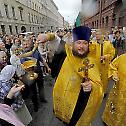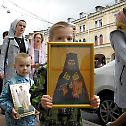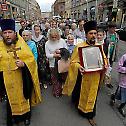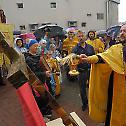The “Savior” Cross procession held in St. Petersburg
On August 13, 2017, the eve of the feast of the Procession of the Honorable and Live-Giving Cross of the Lord, the “Savior” Cross procession took place, reports Religare.ru with information from Patriarchia.ru.
This year’s procession was also dedicated to the memory of holy Hieromartyr Benjamin of Petrograd and Gdov and Archimandrite Sergius (Shein), and martyrs Yuri Novitsky and John Kovsharov, who were executed on the night of August 12-13, 1922. The procession likewise commemorated all the New Martyrs and Confessors of Russia who suffered for the faith after 1917.
Young volunteers helped keep order during the procession.
One of the stops along the procession route was at the home of St. Seraphim of Vyritsa, where the Gospel was read and the faithful were sprinkled with holy water. Besides bearing crosses, banners, and icons, the procession also had a portable belfry, transported just ahead of it so that the ringing of bells would accompany their prayers. A moleben was served to St. Seraphim of Vyritsa at another stopping point.
The “Savior” procession was historically celebrated annually on August 1/14 on the feast of the Procession of the Honorable and Live-Giving Cross of the Lord around the Church of the Savior on Sennoi Square, to commemorate the deliverance of St. Petersburg from a cholera epidemic. In 2016, at the initiative of the Union of Orthodox Businessmen and the parishioners of the Church of St. Seraphim of Vyritsa in the Bolshoi Gostinny Dvor and the Dormition Church on Sennoi Square, the procession was begun once more.
St. Seraphim of Vyritsa, in the world, Vasily Muraviev, as a merchant owned a house near the Sennoi Square, and was a parishioner of the “Savior on Sennoi” Church. After he and his wife by mutual consent each took up the monastic life, St. Seraphim became the father-confessor of the St. Alexander Nevsky Lavra. After the revolution, when persecutions began against the Church, St. Seraphim was arrested fourteen times, suffering beatings and imprisonment in the soviet camps. He settled in the town of Vyritsa, not far from St. Petersburg, after the camps. He was known for his clairvoyance, and stopped the future Patriarch Alexy (Simansky I) from emigrating, foretelling his future service as patriarch of the Russian Orthodox Church.
Source: Orthochristian.com





